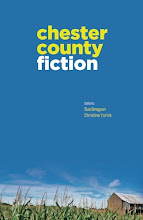I was emailing a writer in West Virginia, and got to thinking about that late, great West Virginia author Breece D'J Pancake. I wanted to ask her a question about his work, but she'd never read him.
Pancake - yes, that was his real name* - killed himself at the age of 26, despite an astonishingly successful debut as a writer of short-stories. His work was compared to that of Ernest Hemingway and James Joyce. Chuck Palahniuk and Andre Dubus III (among others) have cited him as an influence. But Pancake shot himself back in 1983, and he seems to be largely forgotten.
My email question to the West Virginia author? "When writing in West Virginian dialect, Pancake used to write the word "it" as "hit." I've never seen anyone else do that. Is it a good approximation of a local dialect?"
I'm still looking for the answer, in case anyone knows. I was in Weirton, West Virginia, some thirty years ago, and I don't recall how they spoke. (Besides, residents in what passes for an urban center in West Virginia probably don't sound like rural folks.)
If you're interested, there was a nice appreciation of Breece D'J Pancake by Dwight Garner in The New York Times, on the occasion of what would have been Pancake's 55th birthday.
* The only affectation in his name was accidental: when The Atlantic Monthly published his first short story, they printed his middle initials as D'J instead of D.J. The error amused Pancake and he let it stand, both then and on his subsequent publications.




My answer is, hit all depends. Some factors would be the specific geographic locality, what "register" the speaker is using (for instance, you wouldn't say it that way to a schoolteacher, but you might to your cousin) and whether the context is a fixed expression such as "Hit don't make no nevermind." (My father-in-law, who grew up in Randolph County, says that now and then although he left WV in the 1950's and is otherwise strictly an "it" guy.)
ReplyDeleteGenerally speaking, it's more old-fashioned but that doesn't mean you wouldn't find young people using it in some places. Even within a given county, some communities or families might say "hit" while others don't. I imagine the variance between "yours" "y'all's" and "your all's" might show a similar pattern. My mother wouldn't let us say "your all's" at home in Charleston but we could use it freely with our father's relatives in Roane County.